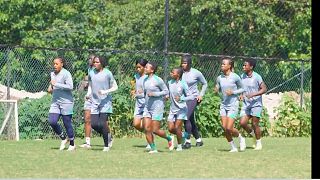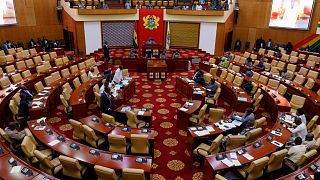Ghana
Although today’s new wave Afrobeats music scene has been strongly dominated by West African giant Nigeria -- where in the 1970s it originated and become popular via Icon Fela Kuti, neighbouring sister country Ghana has been steadily emerging.
And not just in Accra’s clubs but on a huge international market beyond the Motherland’s borders.
Ghanaian Afrobeats artist Stonebwoy -- with his numerous international accolades, exemplifies this uptrend.
He shares his insight on the current state of the genre.
"Not only is Afrobeats hyper-popular here in Ghana, it's now gaining real recognition on the international stage," says Stonebwoy in his Accra recording studio, which is lined with international accolades.
"We are seeing Afrobeats festivals appear in Europe, I am happy to see West African music go so far. I even have hardened fans in India and Bangladesh," says the singer who counts 3.6 million Instagram followers.
"My music sometimes is not traditional music only. It has blended of both traditional music and what a foreigner can relate to. So that is why we have used that method to appeal to the world. Because you can appeal to people from all walks of life."
Ghanaian Afrobeats have a distinct flavour from the nation's legacy of highlife -- the musical genre which adapts traditional rhythms of the Ashanti to Western instruments.
A unique spin on the Afrobeats umbrella.
Wanlov the Kubolor, a Ghanaian musician and filmmaker, explains the intricate makeup of Ghaniana Afrobeats.
"In Ghana music stands out because I think it's more complex and advanced than other music in certain parts of Africa. If we take East Africa, the music is very four four, it's very straight and when you come to West Africa there are a lot of polyrhythms, there are a lot of grooves."
- The Highlife -
The result: contagious rhythms which, served by a powerful voice, form irresistibly catchy pieces.
But the Ghanaian Afrobeats stand out from their Nigerian big sister in one particular way: the legacy of "Highlife".
The genre appeared in colonised Ghana, then called Cote-de-l'Or, at the beginning of the 19th century, by adapting the traditional rhythms of the Ashanti people to Western instruments brought by the colonisers.
It was thanks to Highlife that Ghana enjoyed its first success on the international music scene.
"By the 1970s, big Highlife groups like Osibisa were already filling entire stadiums," recalls Ghanaian-Romanian musician Wanlov the Kubolor, avant-garde cultural icon and author of an offbeat album called 'Afrobeats LOL'.
"But the recent popularity of Afrobeats is of a different nature."
Thanks to the internet, young Ghanaian artists can achieve viral success very quickly, he said.
- Nigeria and Ghana Weaving Afrobeat Waves -
Now, alongside Nigerian stars with millions of social media followers -- Wizkid, Burna Boy, Davido -- Ghanian musicians are emerging to take their turn.
Gyakie and Joey B boast hundreds of thousands of Instagram followers while KiDi has 1.6 million, Sarkodie 4.4 million and Shatta Wale 3.2 million.
Shatta Wale's "Already" featuring Beyonce and Major Lazer was one of the hits of the summer of 2020, securing Ghana a place among the countries which now count on Africa's pop scene.
Jefferson Seneadza, co-founder of the Ghanaian music streaming platform Aftown, which aims to promote African music, has noted "a massive interest in Ghanaian music".
"Our music industry is finally being taken seriously," he says, saying the country can now take its talents to the international stage.
Stonebwoy's latest album, for example, has been listened to over a million times in a week on the platform.
"And a lot of those tapping came from abroad," Seneadza said.
Young singer Gyakie signed a contract with US giant Sony Music earlier this year, shortly after a delegation from the label travelled to Ghana to scout the local market.
"In Afrobeats, Ghana is now in a position to compete with Nigeria," said Jim Donnett, public relations manager of Sony Music West Africa.
"But it's healthy competition."
Musicians attribute this success to the mixture of genres.
"My music is Afro-dancehall influenced by Caribbean music," says Stonebwoy, a bright red cap resting on his braided hair.
"I borrow from Jamaican dancehall, reggae, and cook it all in the big pot of African music, adding the rhythms and melodies unique to the continent."
- Refining a Budding Industry -
Ghanaian Afrobeats artists not only garner millions of social media followers but also see such numbers in streams of their tracks across various international platforms.
However, the local industry might still need to catch up.
Wanlov the Kubolor mentions what changes could help further propel the quickly-developing sector.
"GHAMRO (the Ghana Music Rights Organization) is supposed to go to the radio stations, TV stations, the bars, everywhere and collect money on behalf of musicians. They do it, but they don't collect playlists to see which musician was played how many times, to give the musicians exactly what they deserve."
But Ghana's scene now faces another challenge: the COVID-19 pandemic and the strict health restrictions put in place by the government since March 2020 have been a blow to the music sector across the world.
The cancellations of festivals and concerts, which represent the bulk of income for African artists, have further weakened a sector where funding was already fragile.
"All eyes are on Africa right now, and we, the young Ghanaian creators, feel that it is the right time to emerge," says young talent Sofie on the sidelines of a shoot for a new video in a private villa in Accra.
"What we lack now is a real industry, structured and funded with the help of the state."
- Ghanaian Afrobeats Centre Stage -
Although the COVID-19 pandemic dealt a blow to the music sector across the globe, Ghana's Afrobeats continue to reach fans via the internet -- as Ghanaian artists navigate the budding industry in anticipation of once again being able to tour and take the international stage by storm.
Sofie, a Ghanaian musician (female, English, 13 sec) describes the limitless potential of the genre among Afro people -- and even beyond, worldwide.
"In the past maybe like five years Afrobeats has become huge, especially in America and London. Because the diaspora there - there's a big West African communities."













01:24
French parliament votes to return sacred "talking drum" to Ivory Coast
02:20
Young designers grace the runway at Fashion Finest Africa’s show in Lagos
01:06
Brazil launches major security operation ahead of BRICS Summit
Go to video
Angélique Kidjo makes history as first black African artist on Hollywood Walk of Fame
01:30
Nigerian singer Tems launches Leading Vibe Initiative to support women in music
00:52
Jury deliberating in Sean ‘Diddy’ Combs’ sex trafficking trial